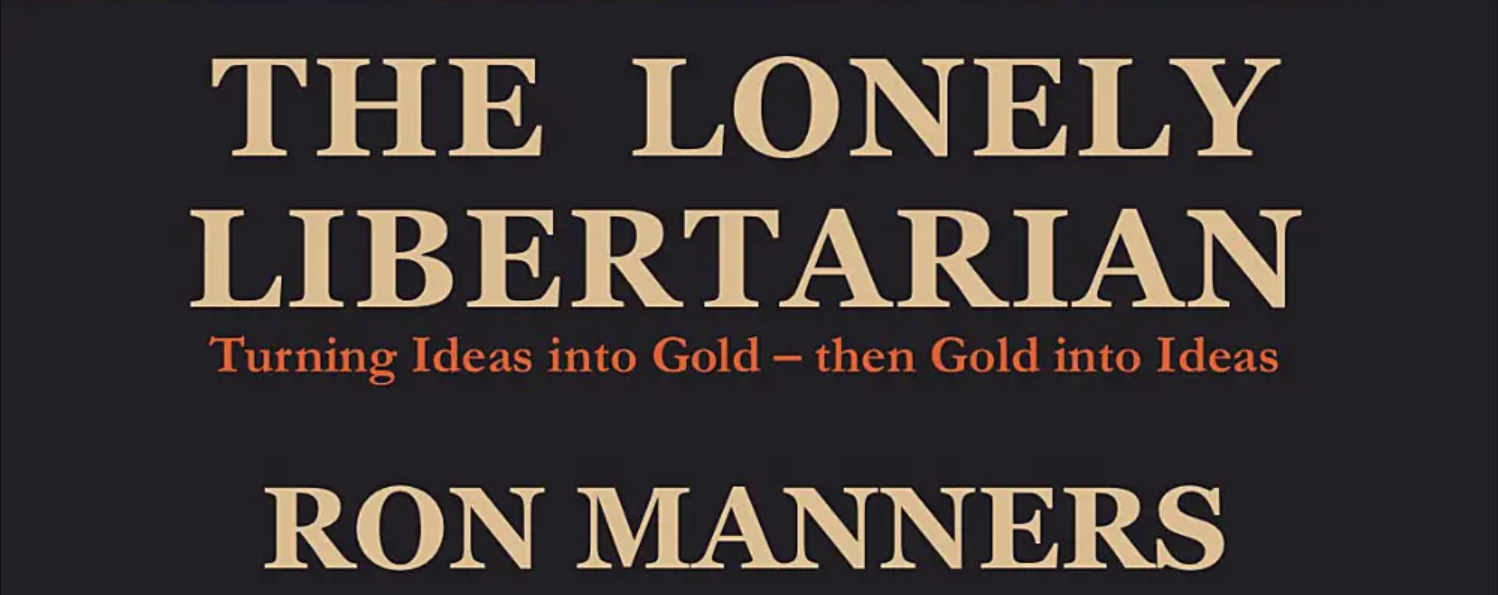I love book launches!
Particularly when the book has proven to be timeless to the point of demanding constant reprints.
This book’s title is The Lonely Libertarian, and the theme of the book is ‘loneliness’. It seems a strange theme when I am seen on the front cover surrounded by a large group of very joyous libertarians. How could I be lonely?
Any one of those young people on the cover will know exactly what I mean when I use the word ‘lonely’ as, one of the unfortunate aspects of current society is that anyone of us who have developed a ‘belief system’ and understands exactly what they stand for, is often made to feel ‘lonely’, simply because they refuse to ‘go along with the mob’. Perhaps you will understand what I mean in this sense, when I use the word ‘lonely’?
The sub-title of the book is, “Turning Ideas into Gold ― then Gold into Ideas”, by investing in the next generation.
What is different about this book?
One of the reasons I have been asked to launch this book, in so many separate locations, is because it is a book which appeals to different people in diverse ways.
The Lonely Libertarian has been launched in various locations around the world with resounding acclaim, but on each occasion it achieved a different focus, from the host of each launch.
At the Brisbane launch with the Australian Institute for Progress, with former Premier, The Hon. Campbell Newman, it was described as “more than just a book; it’s a rallying point for future generations”.
At the Australian Taxpayers’ Alliance in Sydney, it was described as “an example of standing up straight against the Australian Tax Office (and not bending over).”
At the Sydney Mining Club, it was described as “a book to commemorate the 50th anniversary of the Great Australian Nickel Boom that changed the Australian economy forever.”
In Hong Kong, at the Lion Rock Institute, it was described as “a book by an Australian about Hong Kong.”
In London at the Institute of Economic Affairs it was described as, “demonstrating the results of investing in the next generation.”
In New York at a book launch hosted by the Atlas Network it was described as, “explaining the detailed strategy that has made the Mannkal Foundation so effective.”
In Perth at the 2019 NewGenGold Conference, in reference to chapters on the Great Australian Nickel Boom and the Great Gold Renaissance, it was described as an “Industry Bible!”
No doubt if the book were to be launched in Moscow it would be described as “the seven days that shook the world ― a personal account of the fall of The Soviet Union”, as this is the focus of Chapter 10.
I am curious to know what your thoughts may be about the book. How would you describe it?
Moving quickly, let me mention only one aspect of the book (Chapters 6 & 7) which covers my seven ‘fugitive years’ , when I was on the run from the Australian Taxation Department.
They had been entirely unreasonable in their interpretation of their Tax Act and for seven years I had lawyers arguing with them on the definition of “what is a Bona Fide Prospector?”
A quick recap of the outcome may be of interest to any one of you who may have come up against laws ‘of the unreasonable kind’.
I was not getting anywhere, after seven years and paying a fortune to lawyers, to continue their legal arguments, when I bumped into a Californian Tax Attorney, overseas, while I was on the run.
He listened to my outline of the current status and laughed uproariously.
As he was keen to visit Australia he offered to do a pro-bono visit to Australia and, as he said, “put this stupid case to bed in a day or two.”
He did arrive in Australia; we gave him first class exposure over nation-wide ABC.
In his crisp, and unflattering comments, he pointed out that in my case (and it involved many other prospectors at that time) it was not a matter for the law but rather a Constitutional matter.
He stated clearly, over the ABC program, that he was mystified why the lawyers had not been fighting the case on Constitutional grounds.
“In every civilised country, wherever any legislation is ambiguous, it must be interpreted on the side of the citizens.”
“The citizens didn’t draft the legislation, the Parliament did, that’s why if it’s ambiguous it must be interpreted on the citizen’s side.”
“For the ATO to win, would be admitting that Australia is not a civilised country!”
Well, this got nation-wide attention. The phones started running hot at the ABC.
I telephoned the Tax Office the following day saying that “I heard this program on the ABC, and it didn’t appear that they had a strong case after all, and I repeated my earlier offer that if they tore up my files I’d be happy to come back into the workforce.”
About a week later they simply wrote back to me and said, “Okay”, and I have been a happy little taxpayer ever since.
What did I learn from this experience? It was, that when you are confronted with a problem that “won’t go away”, try coming at it from a completely different direction.
Of course, this book is full of little gems like this, and I hope they will help guide your way through this complicated experience called “life”.
I am sure that there will be something in this book that you will pick up and find extremely useful, immediately, and in future years.
The Lonely Libertarian can be purchased here.
Thank you for reading.
Regards,
Ron Manners AO
April 2024
